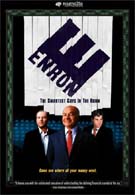As corporate scandals go, it was one heck of a way to start out the 21st century. What causes a company to go from having a worth of $65 billion to being bankrupt in less than four weeks? How do that company’s thousands of employees find themselves suddenly abandoned, all their benefits and retirement funds mysteriously vaporized, while the top executives clear out with hundreds of millions? Why am I not surprised that someone has so quickly produced a film about it? At least we can be thankful it wasn’t an ABC made for TV movie-of-the-week. In fact, as documentaries go, Enron: The Smartest Guys In The Room is an excellent piece of work. Writer and director Alex Gibney succeeds by sticking predominantly to real facts, figures and direct interviews from insiders as he sets about the business of deconstructing the mysterious events surrounding Enron’s shamefully fantastic demise. He steers clear of the sorts of selective rationalizations and editorializing that taint the pseudocumentaries of Michael Moore. Gibney instead focuses on helping you understanding the story instead of limiting your perspective to the one he wants you to share. How you feel about things and who you believe is guilty is left for you to decide.
One of the film’s most fascinating revelations is in fact a socio-political one. The Enron situation didn’t become so monstrous because of government deregulation or a handful of corrupt politicians and sneaky businessmen. When the movie lays the entire story out it becomes clear that the biggest perpetrator was human greed, and not just among the executives. People weren’t asking questions when Enron was earning Americans billions of dollars, helping to drive the stock market to new heights. Pointing out the irony of Enron’s slogan “ask why”, the movie indicates things might have played out much differently if more people in the general public had posed that very question during the company’s rise to glory. Most folks were probably too busy glowing over their stock portfolio or their 401(K) dividends.
Based on the book by the same title, the movie is more than a simple exposé. There’s an incredible artistry that reveals Gibney’s talents as a filmmaker. Woven into the facts and figures are amazing visuals and a wonderfully apt sound track. The man has a gift for adding dimension without descending to the depths of adding biased commentary. He’s out to demystify with the truth and he uses the power of film to do it.
I honestly believe that every American, especially those who invest money in the corporate world, should see this movie. I don’t say this because the Bush administration comes off bad or because folks will finally have an excuse to justify their anger at the corporate world. People should see this because it holds a very honest mirror to the problems American’s face living in a free market economy. The market system itself is not evil or corrupt. It’s the people who operate that market who corrupt it and the responsibility to keep it in check falls on everyone, from the executives to the employees to the citizens who invest.
This movie is also a wake up call to the documentary industry. In a time when guys like Michael Moore are out there producing propaganda in the name of documentary filmmaking, there are artists like Alex Gibney who know better. The truth will set you free and Gibney’s method of truth-telling through art and fact is much more engaging and revealing than the sensationalized stuff we’re used to getting from news companies and the likes of Moore. Here’s hoping we can look forward to more projects like Enron: The Smartest Guys in the Room down the road. The DVD package is less a grouping of special features and more a vital companion to watching and exploring the film. It not only gives you a behind the scenes look at the facts and references used in the movie, it serves as a launching point for following the ongoing story of the Enron scandal.
Indicted Enron executives will be brought to trial later this month and the DVD as a whole is a great way to understand what’s sure to be brought out in the proceedings. Authors Bethany McLean and Peter Elkind share their perspectives and experiences in writing the story of Enron. Fortune Magazine articles and a list of relevant web sites are included as well for those extra bits of useful information.
The movie isn’t just about the facts but also about presenting those facts in an enlightening and artistic manner. Alex Gibney’s commentary is particularly revealing on that point. Gibney hits a little bit on everything from his musical sound track selections to the film’s original score to the joys of film in digital high definition. As he talks about his work you begin to understand how his mind works. He always keeps in focus that he’s trying to tell an honest story while remembering his need to produce a film his audience will be able to watch and understand.
Your Daily Blend of Entertainment News
The most refreshing part of the package was the marketing materials inside. There were none. I’m used to opening a Disney or Tri-star disc case and being bombarded with coupons and pamphlets about upcoming releases. Enron comes in a simple box with nothing but a disc inside. There are a couple of previews for other movies on the disc but they’re easily skipped if you’re not in the mood for pre-show trailers.
Although a bit pricey (good luck finding a copy to rent), the package is still a must see. Get together with some friends, pitch in a few bucks each, and get a copy to watch as a group. It’s some of the best four hours you’ll spend watching a DVD.

